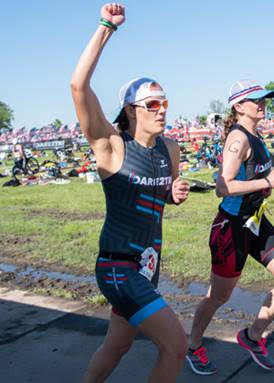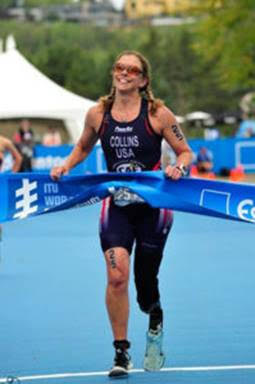Anyone who dares to try a triathlon, an event that combines swimming, biking, and running segments back-to-back deserves a heap of credit. But any individual with disabilities who competes in a triathlon deserves extra attention.
An organization called Dare2Tri helps get athletes with disabilities to the start line…and the finish line…of triathlons around the country.
Founded in 2011, Dare2Tri is a nonprofit organization with a mission to positively impact the lives of athletes with physical disabilities and visual impairments by developing their skills in paratriathlon.
The organization has worked with athletes of all abilities – from beginner to elite – serving youth, adults and injured service members who have a physical disability such as amputation, spinal cord injury, stroke, cerebral palsy, those with visual impairments and blindness and others.
Several athletes from Dare2Tri will be racing in this Sunday’s Boston Triathlon, two of them working together as a team. Ashley Eisenmenger is a blind triathlete, who was born with significant visual impairment and as she grew, her vision continued to decline. She found a run of loving and riding a tandem bike for the first time at a summer camp for blind teens, she knew that she wanted to do a triathlon.
She attended a Dare2tri Paratriathlon Camp in 2015 and became heavily involved in the paratri community. Since then, she has won collegiate and individual National Titles, competes for Team USA and as a member of the Dare2tri Elite Team, and serves as a mentor and coach for other paratriathletes.
She’ll be guided in the race by Patty Collins, who served for 24 years in the US Army as a communications officer. She spent 7 years of her career serving in the Joint Special Operations community in both Iraq an Afghanistan as well as in the US. While in Iraq, Patty was hit by an automobile while cycling to work. Ten months later, Patty decided to amputate the remnants of her leg below the knee—not only so she could move, but move on as well.
Patty started running and cycling again. Patty turned her passion into a road to recovery and started working with other injured veterans through programs that provided adaptive sports as a means of rehabilitation. Patty was a member of the 2016 US Paralympic Team and is a coach for Dare2tri.
“I’ve never been to Boston before so I’m super excited to go to Boston and to be a part of the Columbia Threadneedle Investments Boston Triathlon,” said Eisenmenger. “CTI has been a huge supporter of the Dare2tri Elite Team which has enabled me to reach my goals and I am honored to race at the Boston Tri alongside them. It will be very fun to be guided by one of my teammates and friends.”
There are varying lengths of triathlons. The Ironman is the most famous and arduous, comprising a 2.4 mile ocean swim, a 112-mile bike ride, and a marathon to finish things off. The half iron is what is sounds like – half the Iron distance.
For mere mortals, there are Olympic-distance triathlons, roughly a quarter of
the Iron distance, and Sprint-distance tris, which can vary in length but are
typically half the length of an Olympic distance race.
Prior to the race, athletes rack their bikes in what’s called a Transition area near the water. They’ll lay out their bike shoes, helmet, glasses, and running gear alongside their bikes, along with whatever snacks and beverages they’ll enjoy between the segments of the race.
Once they’ve set up their transitions, they’ll head to the water in their wetsuits and bathing caps, wait on the beach for their wave or group to be called, and then head into the water for a course marked off with buoys and surrounded by safety officers.
They’ll finish the swim, run to the transition zone, get their bike gear on, and move out to the bike course. Once completed, they’ll return to the transition area, re-rack their bikes, shift from bike shoes to running shoes, and complete the final aspect of the race.
This is all hard enough if you’re sighted and fully mobile; it’s much more complicated for blind athletes and athletes with other disabilities.
So if you can make it to South Boston, keep your eyes peeled for the team of Eisenmenger and Collins. They’ll be inspiring spectators and fellow athletes as they make their way around the various aspects of the course.



